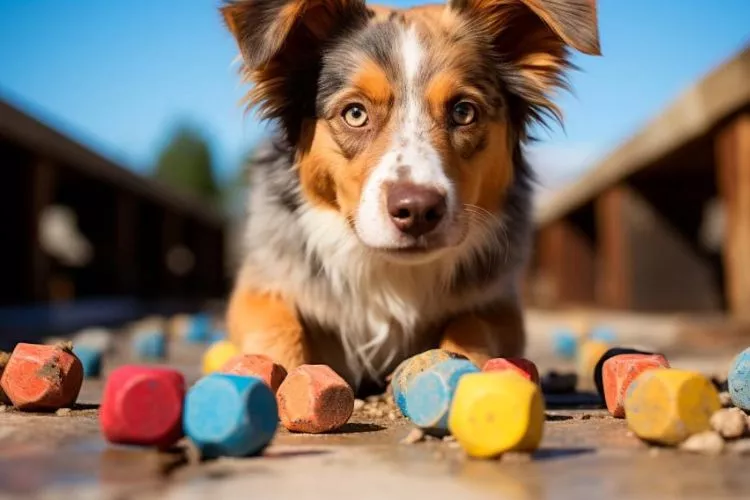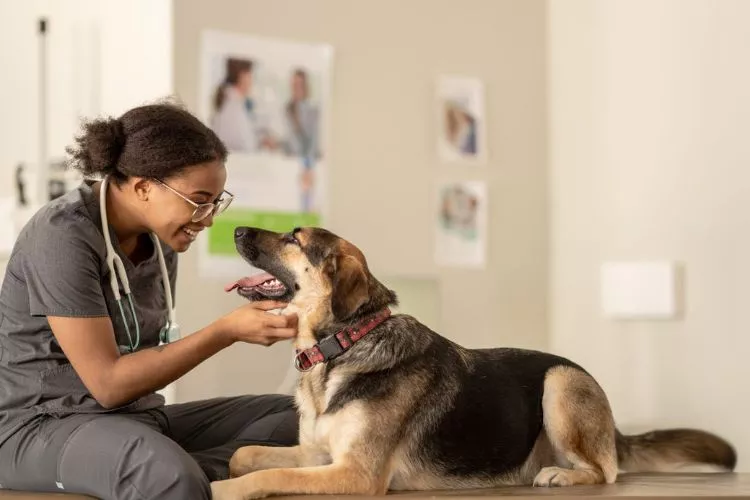Every dog owner knows that these lovable creatures are notorious for getting their noses (and mouths) into things they shouldn’t. One surprising item that raises curiosity is chalk.

Whether it’s sidewalk chalk from kids playing outdoors, gym chalk or chalk used in art, understanding whether it poses a danger to our furry friends is important. This article will dissect the toxicity of chalk to dogs, shedding light on potential health risks and safe alternatives.
🐾 Is chalk toxic to dogs?
While non-toxic in small amounts, chalk can potentially cause health issues for dogs if ingested in large quantities. Chalk itself is not digestible and could cause an intestinal blockage for your dog.
Additionally, some types of chalk may contain chemicals like silica, calcium carbonate, or calcium sulfate that are not suitable for canine consumption and could lead to vomiting or diarrhea.
Even natural chalk dust can cause respiratory issues if inhaled by your dog. It’s best to keep all types of chalk away from areas your dog has access to. Monitor your dog closely when outdoors or in the yard to prevent accidental ingestion.
Signs of a problem after chalk ingestion can include lack of appetite, lethargy, vomiting, or constipation, so contact your vet right away if these symptoms develop after possible chalk exposure.
🐾 The Effects of Chalk Ingestion in Dogs
Chalk is typically made from calcium carbonate and shouldn’t be toxic to dogs in small quantities. However, any ingested non-food items can potentially cause issues depending on the amount consumed and the size of the dog.

- Gastrointestinal Upset: Chalk consumption might cause mild gastrointestinal upset in dogs due to its unfamiliar nature as a substance ingested. Dogs might experience symptoms similar to those exhibited when they eat something that doesn’t agree with their digestive system. These include diarrhea, vomiting, decreased appetite, or generalized lethargy.
- Chalky Stool: A clear symptom of chalk ingestion would be changes in the dog’s stool. It might be visibly chalky or paler than usual due to the color and composition of the chalk.
- Obstruction Risk: In cases where dogs consume large quantities of chalk, or ingest chalk in big pieces, there could be a risk of gastrointestinal obstruction. Symptoms can include repeated vomiting, constipation, abdominal pain, loss of appetite, and behavioral changes.
If these symptoms persist, or if there are any concerns about the amount of chalk your pet has ingested, a visit to the vet is highly recommended. It is always better to err on the side of caution when it comes to the health and safety of our beloved pets.
🐾 Tips for Preventing Chalk Consumption
While chalk in small amounts is generally not harmful to dogs, it’s still better to prevent them from ingesting it. Here are some tips to stop your dog from consuming chalk:
- Maintain Supervision: When in areas where chalk is being used, keep an eye on your dog. Dogs are notorious for ingesting non-food items out of curiosity, and a bit of proactive watching can save you from potential problems.
- Safe Storage: Store chalk in secure containers and place them out of your dog’s reach. Dogs can be ingenious when it comes to getting what they want, so a high shelf or a securely latched box might be the safest bet.
- Regular Exercise: Dogs may consume non-food items due to boredom. Regular exercise and playtime can help mitigate this.
- Dog Toys: Chewing is a part of canine nature. Make sure your dog has plenty of safe and engaging toys to chew on. This will discourage your dog from picking up random objects such as chalk.
- Training: Invest in obedience training. Teaching your dog simple commands like ‘leave it’ can be incredibly helpful in preventing them from eating things they shouldn’t.
- Close Off Areas: If you have a sidewalk chalk art project going on, consider blocking off the area until you’re able to clean up the chalk.
Although these strategies can help decrease the chance of chalk consumption, remember that supervision is the strongest protection against chalk ingestion.
🐾 What To Do If Your Dog Eats Chalk?
As a dog owner, potential ingestion of non-food items by your dog can raise immediate concern. If your dog consumes chalk, here’s a comprehensive guide on what to do:

- Don’t Panic: While it’s crucial to act promptly, maintaining calm will allow you to handle the situation effectively. Chalk, primarily composed of calcium carbonate, is typically not toxic to dogs in small quantities.
- Remove the Chalk: Take any remaining chalk away from your dog to prevent further ingestion.
- Provide Fresh Water: Make sure your dog has plenty of fresh water to drink. This can help facilitate the digestion and excretion process.
- Monitor your Dog: Observe your dog closely for any signs of discomfort, such as gastric upset or changes in behavior.
- Consult a Vet if Necessary: If your dog has consumed a large piece of chalk or is showing symptoms of distress like prolonged vomiting, diarrhea, or fatigue, seek veterinary care immediately.
Using these steps as a guide, you can ensure that the chalk incident will be handled effectively and with minimal harm to your beloved pet.
You may also find useful: Can Dogs Eat Chicken Hearts? | Is irish spring soap toxic to dogs?
🐾 Safe Alternatives to Chalk for Dogs
If your dog has a penchant for chewing non-food items like chalk, it’s beneficial to redirect those inclinations towards safer alternatives.

- Dog-Safe Chew Toys: Numerous types of dog-specific chew toys are available on the market. They can offer hours of entertainment while also promoting dental health.
- Durable Rubber Toys: Items like Kong toys can be especially helpful. They’re tough, they bounce unpredictably to keep dogs mentally stimulated, and you can fill them with healthy treats or peanut butter for added interest.
- Edible Chew Treats: There are many dog-safe edible chew treats available. Things like pig ears, bully sticks, or dental chews can satisfy your dog’s urge to chew while providing a delicious snack.
- Bones: Certain types of bones, like marrow bones, can be a good option. However, cooked bones can splinter and pose a danger, so only provide your dog with raw bones.
- Use Training Treats: Training treats are great to keep your dog mentally stimulated and also meet their chewing needs while getting rewarded.
- Interactive Puzzles and Games: Engaging your dog in puzzle games that stimulate their mind can reduce their need to chew unnecessarily.
Remember, while these are all potential alternatives, supervision is always necessary to prevent choking or any other unexpected incidents.
Conclusion:
While minor consumption of chalk isn’t typically harmful to dogs, it’s crucial to prevent regular or significant ingestion to avoid gastrointestinal issues or obstruction risks.
By observing dogs in areas where chalk is present, storing chalk properly, and providing safe chewing alternatives, dog owners can minimise chalk eating incidents.
Should your dog manage to consume chalk, remain calm, observe for any adverse symptoms, and consult with your vet if necessary. Your dog’s health and safety is paramount, and with the right measures, chalk-related concerns can be successfully managed.
